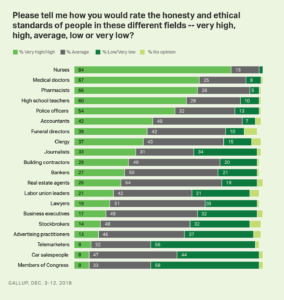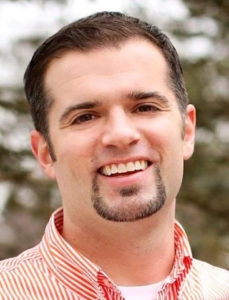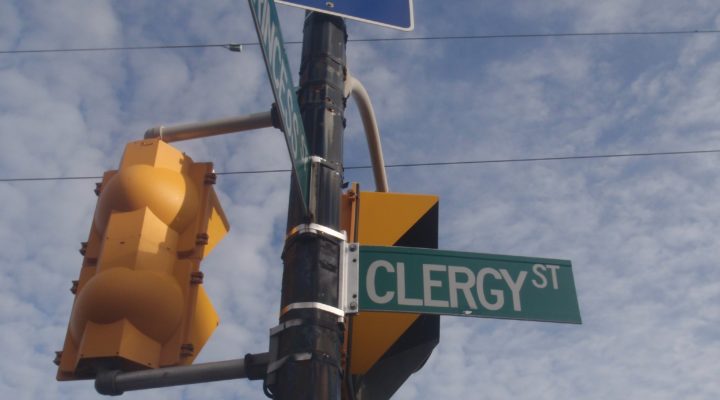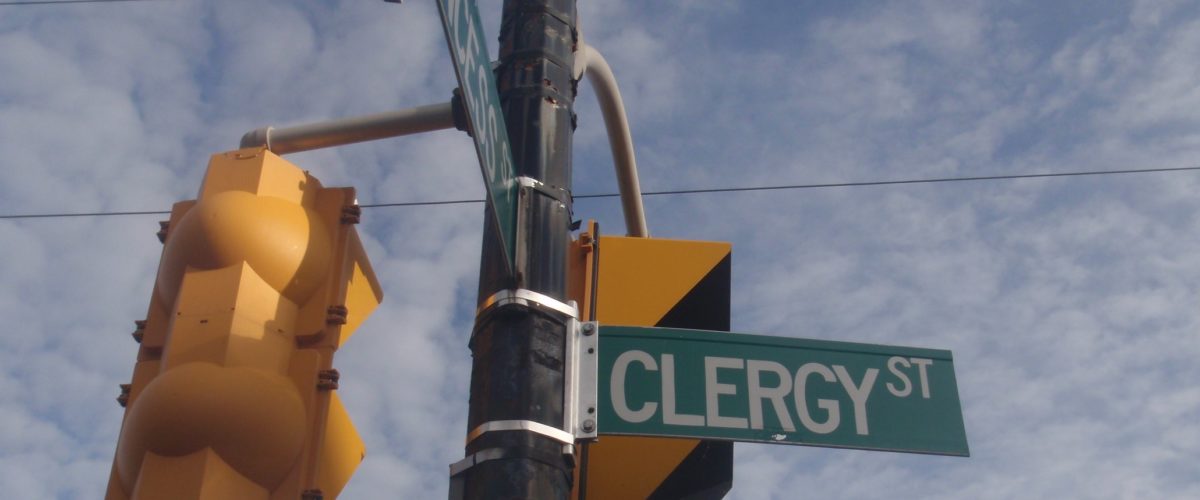Ministers took one to the chin this month when Gallup released a poll placing them in the middle of the pack of professions trusted by the public.
The polling organization asked Americans who they consider to be the most honest and ethical. Nurses and other medical professionals led the pack. Telemarketers, car salespeople and members of Congress scraped the bottom of the barrel.
And right there, just above the half-way point, were clergy –a tad behind funeral directors and a smidgen ahead of journalists.
Gallup said it has measured Americans’ views of clergy honesty and ethics 34 times since 1977, and this year’s 37 percent “very high/high rating is the lowest to date.” The historical high of 67 percent occurred in 1985.
None of the ministers who spoke to Baptist News Global were shocked by the rankings, though they may have been a little bummed.

“Unfortunately, I’m not surprised,” said Alan Rudnick, a Baptist minister, author and speaker who serves as executive minister at DeWitt Community Church in Syracuse, New York.
The years-long, general decline in interest and trust in religious institutions is part of the reason clergy get so few likes, Rudnick said.

Alan Rudnick
“So, when you’re a leader of a religious institution, you get lumped in with that.”
High-profile sex scandals, beginning with those that ravaged the Catholic Church in the early 2000s, have placed ministers under suspicion, regardless of denomination or actual involvement in abusive behaviors.
“For clergy, we’ve never earned the trust back,” said Rudnick.
The intertwining of faith and politics between the White House and conservative Christians doesn’t help either. Ditto for images of super-wealthy, megachurch pastors driving luxury automobiles and flying in personal jets.
“It only confirms people’s mistrust of clergy.”
Plus, Rudnick said, the Gallup findings make sense from a cultural point of view: Americans, and especially Baby Boomers, need to trust health care professionals as their health-care needs rise.
“But people don’t need to trust religious leaders as much because our culture is not framed around religious or theological questions,” he said.
One of ‘those’ Baptists
That reality is illuminated by ways clergy roles have diminished in society, said Merianna Neely, an ordained Baptist minister and pastor of Garden of Grace United Church of Christ in Columbia, South Carolina.
In comments e-mailed to BNG, Neely noted that “many of the duties that clergy historically have performed have been outsourced. You don’t need an ordained clergy to get married. You can have a friend licensed on the internet or go to the courthouse.”

Merianna Neely
Hospice and health-care chaplains in many cases have taken the lead in end-of-life situations for many families, and non-profit organizations are meeting the social needs once addressed primarily by churches and pastors, she noted.
“These are not good or bad changes, but they are changes and these changes impact how people view the role of the clergy. Many people are asking themselves the question, ‘why do we need clergy? Why do we need churches?’”
For some Baptists, there is an additional hurdle created by the politicization of the Southern Baptist Convention, she added. “When I identified as a Baptist, I had to clarify that I wasn’t one of ‘those Baptists’” known to be “very vocal about their view of women and their view of homosexuality.”
“Because their rhetoric is so dogmatic, individuals don’t feel safe to be themselves, to ask questions, or to seek sanctuary from clergy in that tradition. For me, it was always an uphill battle to fight against the stereotypes that all ministers or all Baptists stand on a certain side of an issue.”
Reversing these views of clergy is possible, but not easy.
“The only way this perception can change is by walking with individuals and being open to their stories, their experiences, and their struggles,” Neely said.
‘A liberating force’
The situation for clergy is by no means hopeless.
“There is higher respect than ever for ministers who earn people’s respect, and there is a greater consequence for ministers who don’t,” said George Mason, senior pastor at Wilshire Baptist Church in Dallas, Texas.
But there is a lot of work to do.

George Mason
“Ministers who are trustworthy and who are reliable and who people can trust for their spiritual journeys are seen as all the more remarkable now because there is more of a suspicion of the profession generally,” Mason said. “So, it’s an opportunity in some ways even as it’s a frustrating cultural development.”
The frustrating part is that so many nowadays judge faith as a hindrance to freedom and community, instead of viewing it as the source of spiritual and personal freedom they actually crave.
Politics and materialism have supplanted religion as the source of values and belief, which are no longer tied to religious communities, Mason said.
“What they are really saying is that the particular religious tradition or congregations they grew up in are no longer trustworthy to them, and they are trying to organize their lives on some different basis.”
At the same time, Mason emphasized, it’s an opportunity for clergy to regain relevance and trust by demonstrating a fulfilling model of faith.
“We need to show them that true religion is a liberating force for people to build community, to draw people together, and that it liberates them from hate, it liberates them from oppression, it liberates them from the things that would erode their soul.”


